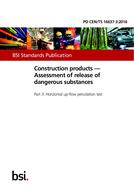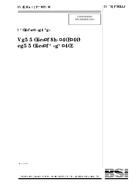
BS PD CEN/TS 16637-3:2016
Click here to purchase
(1) BS PD CEN/TS 16637-3:2016 specifies an Up-flow Percolation Test (PT) which is applicable todetermine the leaching behaviour of inorganic and non-volatile organic substances from granularconstruction products. The test is not suitable for substances that are volatile under ambient conditions.The construction products are subjected to percolation with water as a function of liquid to solid ratiounder specified percolation conditions. The method is a once-through column leaching test.
(2) This up-flow percolation test is performed under specified test conditions for constructionproducts and does not necessarily produce results that mimic specific intended use conditions. This testmethod produces eluates, which can subsequently be characterized by physical, chemical andecotoxicological methods according to existing standard methods. The results of eluate analysis arepresented as a function of the liquid/solid ratio. The test results enable the distinction betweendifferent leaching behaviour.
NOTE 1 Volatile organic substances include the low molecular weight substances in mixtures such as mineral oil.
NOTE 2 It is not always possible to adjust test conditions simultaneously for inorganic and organic substances and test conditions may also vary between different groups of organic substances. Test conditions for organic substances are generally more stringent than those for inorganic substances. The test conditions are generally described in a way that they fit testing organic substances and are also applicable to inorganic substances depending on the set-up.
NOTE 3 For ecotoxicity testing, eluates representing the release of both inorganic and organic substances are needed. In this document, ecotoxicological testing is meant to include also genotoxicological testing. Construction products that exhibit a saturated hydraulic conductivity of about 10-8 m/s or higher canusually be subjected to this test. This procedure is also applicable to materials showing solidification inthe column, if the final hydraulic conductivity is within the specified range. Inert granular materialshould not be added to improve permeability in order to enable their testing.
NOTE 4 This procedure is generally not applicable to products that are easily biologically degradable and products reacting with the leachant, leading, for example, to excessive gas emission or excessive heat release, impermeable hydraulically bound products or products that swell in contact with water.
Cross References:
EN 933-1
EN 14346
EN 16192
EN 16687
EN ISO 3696
ISO 3696
EN ISO 5667-3
ISO 5667-3
ISO 7027
CEN/TS 16637-2
EN 12457
EN 15002
EN 16170
EN 16171
EN 16179
EN 16192
CEN/TS 14405
CEN/TR 16098
CEN/TR 16496
prEN ISO 21268-3
NEN 7373:2004
DIN 19528
All current amendments available at time of purchase are included with the purchase of this document.
Product Details
- Published:
- 06/30/2016
- ISBN(s):
- 9780580573217
- Number of Pages:
- 60
- File Size:
- 1 file , 2.4 MB
- Product Code(s):
- 30153050, 30153050, 30153050
- Note:
- This product is unavailable in United Kingdom

